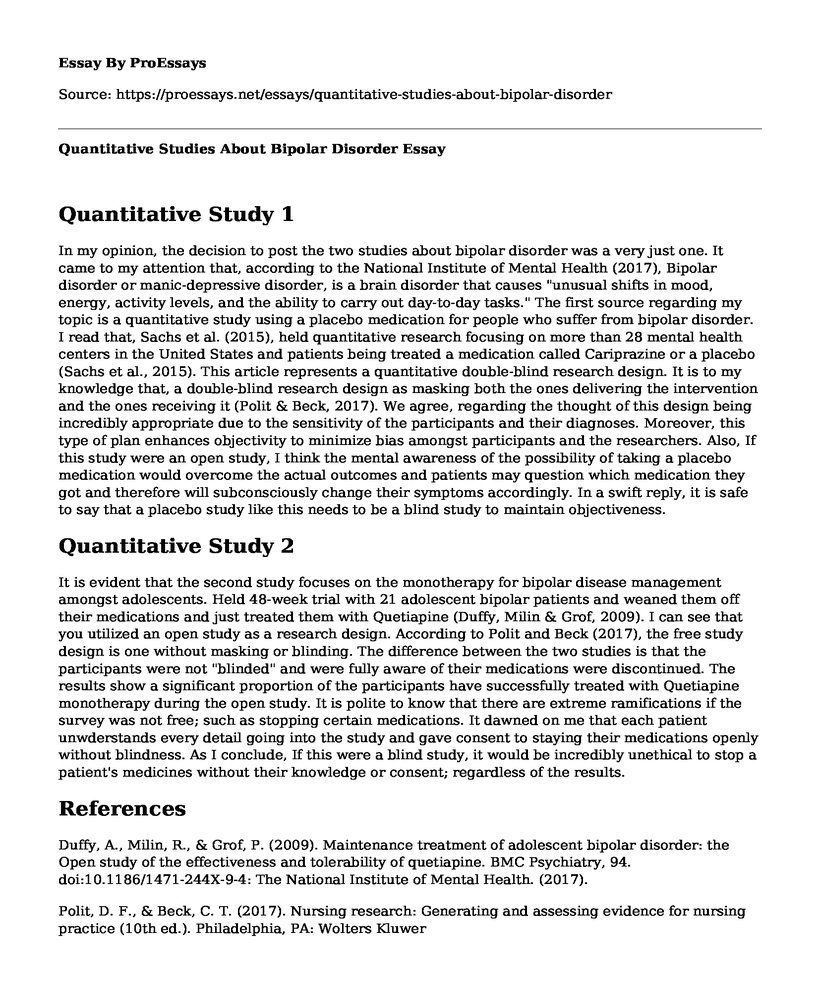Quantitative Study 1
In my opinion, the decision to post the two studies about bipolar disorder was a very just one. It came to my attention that, according to the National Institute of Mental Health (2017), Bipolar disorder or manic-depressive disorder, is a brain disorder that causes "unusual shifts in mood, energy, activity levels, and the ability to carry out day-to-day tasks." The first source regarding my topic is a quantitative study using a placebo medication for people who suffer from bipolar disorder. I read that, Sachs et al. (2015), held quantitative research focusing on more than 28 mental health centers in the United States and patients being treated a medication called Cariprazine or a placebo (Sachs et al., 2015). This article represents a quantitative double-blind research design. It is to my knowledge that, a double-blind research design as masking both the ones delivering the intervention and the ones receiving it (Polit & Beck, 2017). We agree, regarding the thought of this design being incredibly appropriate due to the sensitivity of the participants and their diagnoses. Moreover, this type of plan enhances objectivity to minimize bias amongst participants and the researchers. Also, If this study were an open study, I think the mental awareness of the possibility of taking a placebo medication would overcome the actual outcomes and patients may question which medication they got and therefore will subconsciously change their symptoms accordingly. In a swift reply, it is safe to say that a placebo study like this needs to be a blind study to maintain objectiveness.
Quantitative Study 2
It is evident that the second study focuses on the monotherapy for bipolar disease management amongst adolescents. Held 48-week trial with 21 adolescent bipolar patients and weaned them off their medications and just treated them with Quetiapine (Duffy, Milin & Grof, 2009). I can see that you utilized an open study as a research design. According to Polit and Beck (2017), the free study design is one without masking or blinding. The difference between the two studies is that the participants were not "blinded" and were fully aware of their medications were discontinued. The results show a significant proportion of the participants have successfully treated with Quetiapine monotherapy during the open study. It is polite to know that there are extreme ramifications if the survey was not free; such as stopping certain medications. It dawned on me that each patient unwderstands every detail going into the study and gave consent to staying their medications openly without blindness. As I conclude, If this were a blind study, it would be incredibly unethical to stop a patient's medicines without their knowledge or consent; regardless of the results.
References
Duffy, A., Milin, R., & Grof, P. (2009). Maintenance treatment of adolescent bipolar disorder: the Open study of the effectiveness and tolerability of quetiapine. BMC Psychiatry, 94. doi:10.1186/1471-244X-9-4: The National Institute of Mental Health. (2017).
Polit, D. F., & Beck, C. T. (2017). Nursing research: Generating and assessing evidence for nursing practice (10th ed.). Philadelphia, PA: Wolters Kluwer
Sachs, G. S., Greenberg, W. M., Starace, A., Lu, K., Ruth, A., Laszlovszky, I., & Durgam, S. (2015). Research report: Cariprazine in the treatment of acute mania in bipolar I disorder: A double-blind, placebo-controlled, Phase III trial. Journal of Affective Disorders, 174296-302. doi:10.1016/j.jad.2014.11.018
Cite this page
Quantitative Studies About Bipolar Disorder . (2022, Apr 15). Retrieved from https://proessays.net/essays/quantitative-studies-about-bipolar-disorder
If you are the original author of this essay and no longer wish to have it published on the ProEssays website, please click below to request its removal:
- Happiness and the Virtues According to Aristotle
- Attachment Styles Essay
- Including Client Spirituality or Religious Beliefs in Therapy Essay
- Research Paper on What is Cushing's Syndrome?
- Essay Example on Choose Happiness: A Guide to Satisfaction in Life
- Essay Example on Memoirs: Remembering Past Events and People
- Essay Example on My Spiritual Journey: Meditation and Reflection







